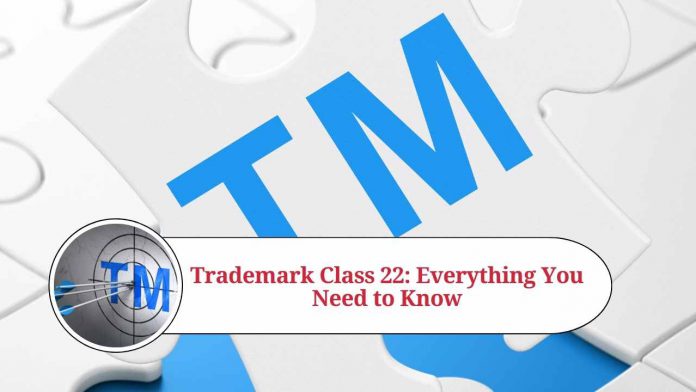Trademark Class 22: Everything You Need to Know
When registering a trademark, it is essential to choose the right class for your goods or services. Trademark Class 22 pertains to all types of ropes, strings, nets, tents, and tarpaulins, among others. In this blog, we will discuss everything you need to know about Trademark Class 22.
What is Trademark Class 22?
Trademark Class 22 is a classification under the Nice Classification system that includes all types of ropes, cords, strings, nets, tents, tarpaulins, awnings, and sails. This class also covers all related products, such as packaging bags made of textile materials, padding and stuffing materials made of rubber or plastic, and raw fibrous textile materials.
What Products Fall Under Trademark Class 22?
Trademark Class 22 encompasses a wide range of products. Some of the goods that fall under this class include:
- Ropes and cords made of textile materials, hemp, jute, cotton, or other natural or synthetic fibers.
- Fishing nets, hammocks, and cordage.
- Tents, tarpaulins, and camping equipment.
- Awning, sunshade, and sailcloth materials.
- Padding and stuffing materials made of rubber or plastic for packing and transport.
- Bags and sacks for transporting materials, including textile materials.
Why is it important to Choose the Correct Trademark Class?
Choosing the right trademark class is essential to ensure that your trademark registration is valid and enforceable. If you register your trademark under the wrong class, it may not provide adequate protection for your products or services. This could result in your trademark being challenged, canceled, or invalidated, which could be costly and time-consuming.
How to Register a Trademark Under Class 22?
To register your trademark under Class 22, you need to follow these steps:
- Conduct a trademark search to ensure that your chosen trademark is not already registered or pending registration under Class 22.
- Determine the specific goods or services that you want to register under Class 22. Be sure to include a detailed description of the products or services.
- Submit your trademark application to the appropriate trademark office, along with the required fees and supporting documents.
- Wait for the trademark office to review your application. If your trademark is approved, it will be registered under Class 22.
Additional Information on Trademark Class 22
Here are some additional points to consider about Trademark Class 22:
- Related Classes While Trademark Class 22 covers many products made of textile materials, it does not include all such products. For example, clothing and footwear are covered by different classes, namely Classes 25 and 28. Similarly, bags made of leather or other materials are covered by Class 18.
- International Classification Trademark Class 22 is part of the Nice Classification system, which is used by most countries worldwide. Therefore, if you register your trademark under Class 22 in one country, it will likely be recognized in other countries that use the same system.
- Renewal Trademark registrations typically last for ten years and can be renewed indefinitely. However, it is important to ensure that your trademark is being used properly and that you continue to pay the required renewal fees to maintain your registration.
- Trademark Infringement If someone else uses a trademark that is similar or identical to your registered trademark in relation to similar goods or services, it may be considered trademark infringement. In such cases, you may be able to take legal action to protect your trademark and prevent others from using it without your permission.
- Consult an Expert Trademark registration can be a complex process, and it is important to ensure that you are following the correct procedures and that your trademark is being registered in the appropriate class. It may be helpful to consult a trademark lawyer or agent to ensure that your trademark registration is valid and enforceable.
Conclusion
Trademark Class 22 covers a broad range of products related to ropes, strings, nets, tents, and tarpaulins, among others. If you are planning to register a trademark under this class, it is important to choose the correct classification to ensure that your trademark is properly protected. By understanding the details of Trademark Class 22 and following the appropriate procedures, you can register your trademark with confidence and enjoy the benefits of trademark protection for your products.
Read more useful content:
Frequently Asked Questions (FAQs)
What products are covered under Trademark Class 22?
Trademark Class 22 covers a broad range of products related to ropes, strings, nets, tents, and tarpaulins, as well as padding and stuffing materials made of rubber or plastic, and raw fibrous textile materials.
What are the benefits of registering a trademark under Class 22?
Registering a trademark under Class 22 provides legal protection for your products and prevents others from using similar trademarks in relation to similar goods. This can help you to establish and maintain a unique brand identity and ensure that your products are not confused with those of your competitors.
How do I choose the correct trademark class for my products?
Choosing the correct trademark class can be challenging, as there are many different classes to choose from. It is important to carefully consider the nature of your products and the goods or services that are most closely related to them. You may also wish to consult with a trademark lawyer or agent to ensure that you are choosing the correct class.
Can I register a trademark under multiple classes?
Yes, you can register a trademark under multiple classes if your products or services fall into more than one category. This can provide additional protection for your brand and ensure that your trademark is recognized across a wide range of products and services.
How long does it take to register a trademark under Class 22?
The process of registering a trademark can take several months or longer, depending on the jurisdiction and the complexity of the application. It is important to be patient and to provide all necessary information and documentation in a timely manner to ensure that your application is processed as quickly as possible.
Can I renew my trademark registration under Class 22?
Yes, trademark registrations can be renewed indefinitely, as long as you continue to use your trademark in a manner consistent with your registration and pay the required renewal fees.
What if someone else is using a similar trademark in relation to similar products?
If someone else is using a trademark that is similar or identical to your registered trademark in relation to similar products, this may constitute trademark infringement. In such cases, you may wish to seek legal advice to determine the best course of action.
How can I monitor my trademark to ensure that it is being used correctly?
It is important to monitor your trademark to ensure that it is being used correctly and that no one else is infringing on your rights. This can be done through regular searches for similar trademarks and monitoring of your products and services to ensure that they are being marketed and sold appropriately.
Can I transfer my trademark registration to someone else?
Yes, trademark registrations can be transferred to another person or entity through a process known as assignment. This can be useful if you are selling your business or transferring ownership of your trademark to another party.
Do I need to hire a trademark lawyer or agent to register my trademark under Class 22?
While it is not strictly necessary to hire a trademark lawyer or agent, doing so can be beneficial to ensure that your application is complete and accurate and that your trademark is properly protected. A trademark lawyer or agent can also provide guidance on the registration process and help you to navigate any challenges that may arise.




















